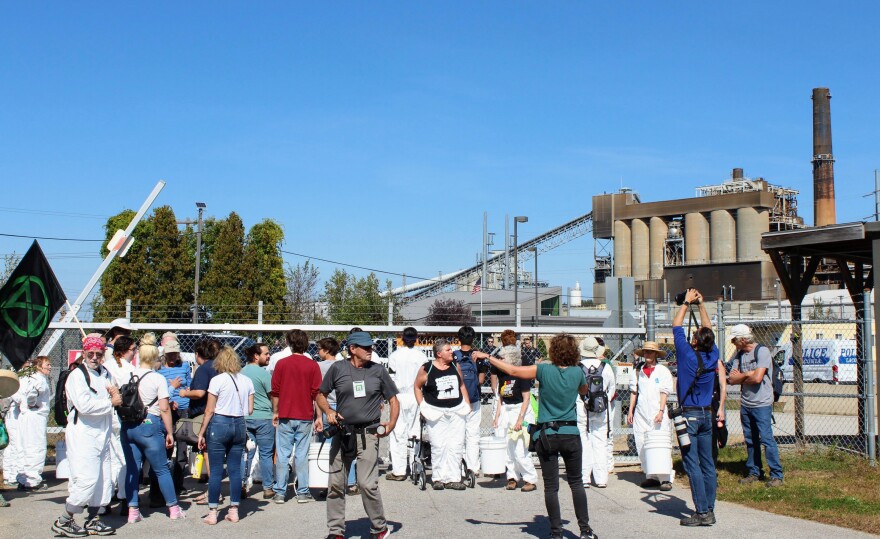A judge heard impassioned testimony Thursday from 20 climate change activists who were arrested for trespassing at New Hampshire’s coal-fired power plant in Bow in 2019.
During a four-hour telephonic sentencing hearing with Concord District Court Judge Edwin Kelly, each defendant opted to receive a jury trial in Superior Court and laid out their reasons for allegedly trespassing on the grounds of Merrimack Station in Bow.
The plant, sold by Eversource to Granite Shore Power in 2018, is the last coal-fired facility in New England that's not set to retire. Climate activists say it’s part of an uneconomical system that’s catastrophically warming the Earth and must end.
“I went to Bow because I love people and I love this planet,” said defendant Sonia Birthisel, a sustainable farming researcher in Maine. “That love compels me to go beyond the comfortable, societally palatable response to climate change that was simply doing my day job.”
Others said they were fighting for their children’s future, lower energy costs and a just transition for fossil fuel workers.
Many younger activists said they fear what the world will become if facilities like Bow’s aren’t closed, and said they felt called to be brave and act in support of that goal.
“It’s a struggle to feel like a map for the rest of my life can even be drafted, when the planet around me seems to be breaking down, and that there’s nothing I can do about it,” said Daniel Flynn. “But the thought of being a bystander while the threats that climate change poses grow exponentially brings me even more grief.”

Protesters told the judge they want jury trials as a chance to prove that their actions were deliberately nonviolent, and necessary to spur action on climate change – where progress through political channels has been, to them, maddeningly slow.
“The speed of bureaucracy is not going to cut it,” said Dana Dwinell-Yardley, who argued that New England’s electric ratepayers have too little recourse for the fact that they subsidize the coal plant through its commitments to provide future power to the regional grid.
The next auction of those commitments will be held in early February, an event that could decide whether the plant stays open for several more years. The protesters said the goal of their activism is the closure of the plant as soon as possible.
But their attorney, Kira Kelley, told the judge this stated goal was meant as a call to public action when the group gathered at Merrimack Station for the 2019 demonstration. She said the protesters made no physical threats of destruction against the plant.
“Every single one of my clients today has shown that they too, like the practice of sentencing itself, share the goal of making the community whole,” she said. “My clients build community with every endeavor they undertake.”

The protest was the largest environmental demonstration in the state in a generation, since mass arrests at Seabrook Nuclear Power Plant in the 1970s.
The Bow demonstration also brought out an uncommonly large New Hampshire law enforcement presence. Multiple state and local agencies, air and water support, and officers in riot gear with batons and shields waited to arrest protesters as they proceeded past the plant’s “no trespassing” signs.
Get NHPR stories about climate change delivered to your inbox. Sign up for our newsletter today.
Concord city prosecutor Tracy Connolly said if the cases went before a jury, the state would prove that the protesters deliberately chose to break the law in the exercise of free speech.
“At no time does the state take any issue with the message this protest was trying to take,” Connolly told the judge. “It is just the manner in which they did it – the commission of a crime in furtherance of that message.”
Connolly said the protesters should face sentences that will deter future law-breaking. She’s recommending fines of between $600 and $800 for most defendants.
A few have pending charges of bail violation, related to the blockade of a train carrying coal to Bow through Hooksett. In addition to fines, Connolly is recommending those protesters face 30 days of jail time if they don’t complete a year of good behavior.
An order that will send the cases to Superior Court is due out in the next month. Nearly 50 other people arrested at the protest previously took plea deals in the case.
CORRECTION: A previous version of this story incorrectly stated that Judge Kelly would decide whether the protesters received sentences or jury trials. In fact, the jury trials will be an automatic next step.






